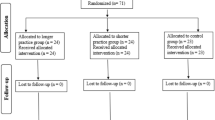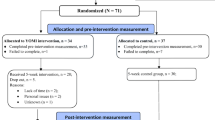Abstract
Mindfulness-based interventions encourage home practice to cultivate the development and enhancement of skills. The degree to which adolescents practice mindfulness outside of sessions and whether such home practice relates to measurable outcomes has not been investigated. The present study investigated the effects of home practice compliance on cognitive and psychological outcomes, as well as the relationship between intervention expectations and home practice compliance in adolescents participating in a school-based mindfulness program. As part of a randomized controlled trial, participants completed either a mindfulness meditation (n = 76) or hatha yoga (n = 92) intervention. Pre- and post-intervention measures of working memory capacity, perceived stress, anxiety, and mindfulness were collected. Participants also completed a daily home practice log during the intervention in which they recorded the number of minutes spent practicing mindfulness meditation or hatha yoga. Results indicated that home practice compliance was poor relative to suggested home practice in both intervention groups; however, the hatha yoga group reported significantly more home practice than the mindfulness meditation group (p = 0.003). Hatha yoga participants who engaged in more home practice (upper tertile) showed a statistically significant decrease in perceived stress, while those who reported the lowest amount of home practice (bottom tertile) showed an increase in stress. In the yoga condition, intervention expectations were positively correlated with home practice (ρ = 0.28, p < 0.05). Current findings suggest that home practice compliance is related to stress reduction in hatha yoga interventions for adolescents. Limitations and avenues for future research are discussed.

Similar content being viewed by others
References
Baer, R. A., Carmody, J., & Hunsinger, M. (2012). Weekly change in mindfulness and perceived stress in a mindfulness-based stress reduction program. Journal of Clinical Psychology, 68(7), 755–765. doi:10.1002/jclp.21865.
Bennett, K., & Dorjee, D. (2016). The impact of a mindfulness-based stress reduction course (MBSR) on well-being and academic attainment of sixth-form students. Mindfulness, 7(1), 105–114. doi:10.1007/s12671-015-0430-7.
Biegel, G. M., Brown, K. W., Shapiro, S. L., & Schubert, C. M. (2009). Mindfulness-based stress reduction for the treatment of adolescent psychiatric outpatients: a randomized clinical trail. Journal of Consulting and Clinical Psychology, 77, 855–866. doi:10.1037/a0016241.
Brisbon, N. M., & Lowery, G. A. (2011). Mindfulness and levels of stress: a comparison of beginner and advanced Hatha yoga practitioners. Journal of Religion and Health, 50, 931–941. doi:10.1007/s10943.009.9305.3/.
Burns, D. D., & Spangler, D. L. (2001). Can we confirm our theories? Can we measure causal effects? Reply to Kazantzis et al. (2001). Journal of Consulting and Clinical Psychology, 69, 1084–1086. doi:10.1037/0022.006X.69.6.1084.
Carlozzi, B. L., Winterowd, C., Harrist, R. S., Thomason, N., Bratkovich, K., & Worth, S. (2010). Spirituality, anger, and stress in early adolescents. Journal of Religion and Health, 49, 445–459. doi:10.1007/s10943.009.9295.1.
Carlson, L., Speca, M., Patel, K., & Goodey, E. (2004). Mindfulness-based stress reduction in relation to quality of life, mood, symptoms of stress and levels of cortisol, dehydroepiandrosterone sulfate (DHEAS) and melatonin in breast and prostate cancer outpatients. Psychoneuroendocrinology, 29, 448–474.
Carmody, J., & Baer, R. A. (2008). Relationships between mindfulness practice and levels of mindfulness, medical and psychological symptoms and well-being in a mindfulness-based stress reduction program. Journal of Behavioral Medicine, 31, 23–33.
Carmody, J., & Baer, R. (2009). How long does a mindfulness-based stress reduction program need to be? A review of class contact hours and effect sizes for psychological distress. Journal of Clinical Psychology, 65, 627–638. doi:10.1002/jclp.20555.
Carson, J., Carson, K., Gil, K., & Baucom, D. (2004). Mindfulness-based relationship enhancement. Behavior Therapy, 35, 471–494.
Conway, A. R., Kane, M. J., Bunting, M. F., Hambrick, D. Z., Wilhelm, O., & Engle, R. W. (2005). Working memory span tasks: a methodological review and user’s guide. Psychonomic Bulletin and Review, 12(5), 769–786.
Davidson, R., Kabat-Zinn, J., Schumacker, J., Rosenkranz, M., Muller, D., Santorelli, S., Urbanowski, F., Harrington, A., Bonus, K., & Sheridan, J. F. (2003). Alterations in brain and immune function produced by mindfulness meditation. Psychosomatic Medicine, 65, 564–570.
Felver, J. C., Butzer, B., Olson, K. J., Smith, I. M., & Khalsa, S. B. (2015). Yoga in public school improves adolescent mood and affect. Contemporary School Psychology, 19(3), 184–192. doi:10.1007/s40688-014-0031-9.
Fletcher, L. B., Schoendorff, B., & Hayes, S. C. (2010). Searching for mindfulness in the brain: a process-oriented approach to examining the neural correlates of mindfulness. Journal of Mindfulness, 1, 41–63. doi:10.1007/s12671-010-0006-5.
Frank, J. L., Bose, B., & Schrobenhauser-Clonan, A. (2014). Effectiveness of a school-based yoga program on adolescent mental health, stress coping strategies, and attitudes toward violence: findings from a high-risk sample. Journal of Applied School Psychology, 30, 29–49. doi:10.1080/15377903.2013.863259.
Gallant, S. N. (2016). Mindfulness meditation practice and executive functioning: breaking down the benefit. Consciousness and Cognition, 40, 116–130. doi:10.1016/j.concog.2016.01.005.
Gaynor, S. T., Lawrence, P. S., & Nelson-Gray, R. O. (2006). Measuring homework compliance in cognitive-behavioral therapy for adolescent depression: review, preliminary findings, and implications for theory and practice. Behavior Modification, 30, 647–672. doi:10.1177/0145445504272979.
Goodman, T. A. (2005). Working with children: beginner’s mind. In C. K. Germer, R. D. Siegel, & P. R. Fulton (Eds.), Mindfulness and psychotherapy (pp. 197–219). New York: Guilford Press.
Gordon, J. S., Staples, J. K., Blyta, A., & Bytyqi, M. (2004). Treatment of posttraumatic stress disorder in postwar Kosovo high schools using mind-body skills groups: a pilot study. Journal of Traumatic Stress, 17, 143–147. doi:10.1023/B:JOTS.0000022620.13209.a0.
Goyal, M., Singh, S., Sibinga, E. M. S., Gould, N. F., Rowland-Seymour, A., Sharma, R., Berger, Z., Sleicher, D., Maron, D. D., Shihab, H. S., Ranasinghe, P. D., Linn, S., Saha, S., Bass, E. B., & Haythornthwaite, J. A. (2014). Meditation programs for psychological stress and well-being: a systematic review and meta-analysis. JAMA Internal Medicine, 174(3), 357–368. doi:10.1001/jamainternmed.2013.13018.
Greco, L. A., Baer, R. A., & Smith, G. T. (2011). Assessing mindfulness in children and adolescents: development and validation of the child and adolescent mindfulness measure (CAMM). Psychological Assessment, 23, 606–614. doi:10.1037/a0022819.
Greenberg, M. T., & Harris, A. R. (2012). Nurturing mindfulness in children and youth: current state of research. Child Development Perspectives, 6, 161–166. doi:10.1111/j.1750-8606.2011.00215.x.
Greeson, J. M., Smoski, M. J., Suarez, E. C., Brantley, J. G., Ekblad, A. G., Lynch, T. R., & Quillian Wolever, R. (2015). Decreased symptoms of depression after mindfulness-based stress reduction: potential moderating effects of religiosity, spirituality, trait mindfulness, sex, and age. The Journal of Alternative and Complementary Medicine, 21(3), 166–174. doi:10.1089/acm.2014.0285.
Hagins, M., & Rundle, A. (2016). Yoga improves academic performance in urban high school students compared to physical education: a randomized controlled trial. Mind, Brain, and Education, 10(2), 105–116. doi:10.1111/mbe.12107.
Hale, W. W., Crocetti, E., Raaijmakers, Q. A., & Meeus, W. H. (2011). A meta-analysis of the cross-cultural psychometric properties of the Screen for Child Anxiety Related Emotional Disorders (SCARED). Journal of Child Psychology and Psychiatry, 52(1), 80–90. doi:10.1111/j.1469-7610.2010.02285.x.
Jastrowski Mano, K. E., Salamon, K. S., Hainsworth, K. R., Anderson Khan, K. A., Ladwig, R. J., Davies, W. H., & Weisman, S. J. (2013). A randomized controlled pilot study of mindfulness-based stress reduction for pediatric chronic pain. Alternative Therapies in Health and Medicine, 19(6), 8–14.
Kabat-Zinn, J. (1990). Full catastrophe living: using the wisdom of your body and mind to face stress, pain, and illness. New York: Delacorte Press.
Kabat-Zinn, J., Massion, A. O., Kristeller, J., Peterson, L. G., Fletcher, K. E., Pbert, L., Lenderking, W. R., & Santorelli, S. F. (1992). Effectiveness of a meditation-based stress reduction program in the treatment of anxiety disorders. The American Journal of Psychiatry, 149(7), 936–943.
Kerrigan, D., Johnson, K., Stewart, M., Magyari, T., Hutton, N., Ellen, J. M., & Sibinga, E. M. S. (2011). Perceptions, experiences, and shifts in perspective occurring among urban youth participating in a mindfulness-based stress reduction program. Complementary Therapies in Clinical Practice, 17, 96–101. doi:10.1016/j.ctcp.2010.08.003.
Mendelson, T., Greenberg, J. K. D., Gould, L. F., Rhoades, B. L., & Leaf, P. J. (2010). Feasibility and preliminary outcomes of a school-based mindfulness intervention for urban youth. Journal of Abnormal Child Psychology, 38, 985–994. doi:10.1007/s10802.010.9418.x.
Miller, J. J., Fletcher, K., & Kabat-Zinn, J. (1995). Three-year follow-up and clinical implications of a mindfulness meditation-based stress reduction intervention in the treatment of anxiety disorders. General Hospital Psychiatry, 3, 192–200. doi:10.1016/0163-8343(95)00025-M.
Mrazek, M. D., Franklin, M. S., Phillips, D. T., Baird, B., & Schooler, J. W. (2013). Mindfulness training improves working memory capacity and GRE performances while reducing mind wandering. Psychological Science, 24, 776–781. doi:10.1177/0956797612459659.
Parker, A. E., Kupersmidt, J. B., Mathis, E. T., Scull, T. M., & Sims, C. (2014). The impact of mindfulness education of elementary school students: evaluation of the Master Mind program. Advances in School Mental Health Promotion, 7(3), 184–204. doi:10.1080/1754730X.2014.916497.
Quach, D., Jastrowski Mano, K. E., & Alexander, K. (2016). A randomized controlled trial examining the effect of mindfulness meditation on working memory capacity in adolescents. Journal of Adolescent Health, 58, 489–496. doi:10.1016/j.jadohealth.2015.09.024.
Rani, N. J., & Rao, P. V. K. (1996). Meditation and attention regulation. Journal of Indian Psychology, 14, 26–30.
Semple, R. J., Reid, E. F. G., & Miller, L. (2005). Treating anxiety with mindfulness: an open trial of mindfulness training for anxious children. Journal of Cognitive Psychotherapy, 19, 379–392. doi:10.1891/jcop.2005.19.4.379.
Shapiro, S. L., Brown, K. W., & Biegel, G. M. (2007). Teaching self-care to caregivers: effects of mindfulness-based stress reduction on the mental health of therapists in training. Training and Education in Professional Psychology, 1, 105–115.
Sharma, M. (2014). Yoga as an alternative and complementary approach for stress management: a systematic review. Journal of Evidence-Based Complementary and Alternative Medicine, 19, 59–67. doi:10.1177/2156587213503344.
Sibinga, E., Kerrigan, D., Stewart, M., Johnson, K., Magyari, T., & Ellen, J. M. (2011). Mindfulness-based stress reduction for urban youth. Journal of Alternative Complementary Medicine, 17, 213–218. doi:10.1089/acm.2009.0605.
Strawn, J. R., Cotton, S., Luberto, C. M., Rodrigo, P. L., Stahl, L. A., Weber, W. A., Eliassen, J. C., Sears, R., & DelBello, M. P. (2016). Neural function before and after mindfulness-based cognitive therapy in anxious adolescents at risk for developing bipolar disorder. Journal of Child and Adolescent Psychopharmacology, 26(4), 372–379. doi:10.1089/cap.2015.0054.
Tan, L., & Martin, G. (2015). Taming the adolescent mind: a randomized controlled trial examining clinical efficacy of an adolescent mindfulness-based group programme. Child and Adolescent Mental Health, 20(1), 49–55. doi:10.1111/camh.12057.
Velásquez, A. M., López, M. A., Quiñonez, N., & Paba, D. P. (2015). Yoga for the prevention of depression, anxiety, and depression and the promotion of social-emotional competencies in school-aged children. Educational Research and Evaluation, 21, 407–421. doi:10.1080/13803611.2015.1111804.
Vettese, L. C., Toneatto, T., Stea, J. N., Nguyen, L., & Wang, J. J. (2009). Do mindfulness meditation participants do their homework? And does it make a difference? A review of the empirical evidence. Journal of Cognitive Psychotherapy: An International Quarterly, 23, 198–225. doi:10.1891/0889.8391.23.3.198.
West, J., Otte, C., Geher, K., Johnson, J., & Mohr, D. C. (2004). Effects of Hatha yoga and African dance on perceived stress, affect, and salivary cortisol. Annals of Behavioral Medicine, 28, 114–118. doi:10.1207/s15324796abm2802_6.
Zeidan, F., Johnson, S. K., Diamond, B. J., David, Z., & Goolkasian, P. (2010). Mindfulness meditation improves cognition: evidence of brief mental training. Consciousness and Cognition, 19, 575–605. doi:10.1016/j.concog.2010.03.014.
Author information
Authors and Affiliations
Corresponding author
Ethics declarations
Funding
No funding to report.
Ethical Approval
All procedures performed in studies involving human participants were in accordance with the ethical standards of the institutional and/or national research committee and with the 1964 Helsinki declaration and its later amendments or comparable ethical standards.
Informed Consent
Informed consent was obtained from all individual participants included in the study.
Conflict of Interest
D. Quach declares that she has no conflict of interest.
R.C. Gibler declares that he has no conflict of interest.
K.E. Jastrowski Mano declares that she has no conflict of interest.
Rights and permissions
About this article
Cite this article
Quach, D., Gibler, R.C. & Jastrowski Mano, K.E. Does Home Practice Compliance Make a Difference in the Effectiveness of Mindfulness Interventions for Adolescents?. Mindfulness 8, 495–504 (2017). https://doi.org/10.1007/s12671-016-0624-7
Published:
Issue Date:
DOI: https://doi.org/10.1007/s12671-016-0624-7




